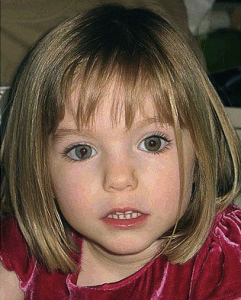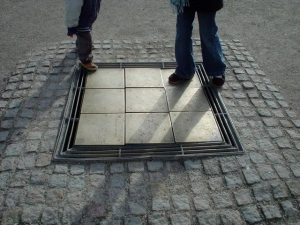
A blonde little girl with blue eyes is defencelessly looking at us from hundreds of walls: standing at the tube station, at the bus stop or just walking in the street without feeling sorry for her, is impossible. Every corner in town is plastered with posters of the book of Kate McCann, mother of Madeleine, the three years old who disappeared on May 2007 while she was on holiday with her family in Praia da Luz, Portugal, and hasn’t been found yet. Despite the Portuguese police archiving her search three years ago, her parents has never stopped shouting their pain to the world.
Around 140.000 children go missing every year in the UK, including ‘runaway’, parental abductions and ‘stranger’ abductions – as happened to Madeleine. In 2009, 64% of the 356.000 incidents reported to the Home Office’s Missing People Bureau were under age. Although the majority of the disappearance is solved within the first 48 hours, there are still a lot of lonely children out there and a lot of families are fighting to bring them home.
To cope with such traumatic loss, parents need emotional, practical and legal advice, as well as the reassurance that everything possible is being done to find their missing loved one. A number of charities like Missing People, Childline, Forever Searching and PACT – Parents and Abducted Children Together – work actively to help worried families.
After the International Missing Children’s Day – on May 25 – brought the issue to the public attention, an important goal has been reached by campaigns claiming parents don’t receive enough support from the government. A parliamentary inquiry, organised by the All Party Parliamentary Group on Runaway and Missing Children and Adults, is about to start and would improve the alleged “lack of service”.
Although the McCann family has been strongly criticised at times for publicising their daughter’s disappearance, the steps gained by campaigners suggest how important it is to keep on shouting and appeal to the sensitiveness of the people. NCMEC, the National Centre for Missing and Exploited Children, in its “Family survival guide”, strongly advises parents to contact the media as soon as the disappearence is reported because it’s much more efficient than posters.
Apparently, publicity is crucial to trace a missing person. But how can parents get hold of such attention?
“Our charity provides specialised support to ease the heartache and confusion of the families and also help the search with publicity appeals that can reach millions,” said Amalia McGibbons, spokeperson of Missing People. “Appearing on the media can help to gather vital information from the public and also reach the missing person and encourage them to make contact.”
The police would approach the media in the most serious cases and launch a Child Rescue Alert on the national broadcast service when they believe the child is being kidnapped or in danger of death. An urgent bulletin with details about the abduction would spread the report, giving the public a number to contact if they have information that could locate the child.
“We always try to use the media extensively because this system has proved another very helpful tool, even though it still needs to be improved, as we had some cases where the investigations were quicker than the media response,” said Charlie Hedges, Liaison and Support officer at NPIA, National Policing Improving Agency. “We will make an agreement with BBC and Sky for the broadcast of the Alert and we are thinking of extending it also to social media and sms.”
Until now, there hasn’t been a specific service to trace missing children, and the Home Office’s Missing Persons Bureau, part of the NPIA, has helped the police with training, coordination of resources and assistance in identifying bodies for missing people of all ages.
Finally, from next month the emergency service for under age people will be managed by the Child Exploitation and Online Protection Centre, CEOP, a unit that since 2006 works in partnership with local and international forces to track child offenders.
“We will apply our experience with child protection to make the response focused and, therefore, more efficient,” said Mr Nagel, head of Strategy, Policy and Governance of CEOP.
The first things that his team will do are collecting information from various sources and build up strategic knowledge on children abduction, sex exploitation and trafficking. There are so many data and activities to manage, that partnerships with both the voluntary and private sectors become crucial.
“Unfortunately, there is no one source of information that collects data about all missing people in the UK, but only a series of studies and various databases,” said Mr Nagel. “If we integrate these information with more specific analysis, we would be able to act more quickly.”
Police officers and the NPIA exchange information through the website missingkids.com, a database about all the missing children in 15 countries that also has an age-progression application, which allows them to identify children years after they went missing. In addition to those data, the International Centre of Missing and Exploited Children provides the Global Missing Children’s Network and also a channel on Youtube called “Don’t You Forget About Me”, featuring videos of missing kids and also educational materials in different languages and messages of support for the families.
“We already work side by side with the NSPCC – the national leading charity for child protection – and our aim is to collaborate with all the NGOs across the UK,” said Mr Nagel.
Charities provide a range of partner services for Police in handling investigations, including publicity appeals, sightings management and helplines, as well as supporting the families left behind. “Our team must be able to address the parents of the kid to the right associations where they can find the support and advice that is needed in such situations,” Mr Nagel said, concerned.
 “Of course, it’s important to commit most effort and resources in the search for missing children,” he added, “but if we manage to prevent the miss with campaigns and monitoring vulnerable teenagers, we can avoid a lot of harm and also save public money.”
“Of course, it’s important to commit most effort and resources in the search for missing children,” he added, “but if we manage to prevent the miss with campaigns and monitoring vulnerable teenagers, we can avoid a lot of harm and also save public money.”
Creating a system where families are advised on children’s safety, including protection from potentially risky websites, and how to cope with vulnerable kids, would help creating public consciousness on the issue and some incidents could be avoided. All this couldn’t be reached without the action of strong and obstinate parents who refuse to give up.
We see the persistence of the McCanns, who are continuously campaigning to find their daughter and fight for an internationally linked investigative system. They’ve funded a website, a charity, a forum, organize money-raising sell and have just published a book. Their private detectives are still searching for Madeleine and will continue until she is found. Kate McCann also wrote a letter to the Sun last month, asking for help from David Cameron, who answered he is very concerned for their daughter and offered the assistance of the Metropolitan Police. She will also give evidence in the government’s inquiry on the service given to parents of missing children, together with other two mothers in her situation.
We can only imagine the pain that falls on a family when a child disappears. Meanwhile, seeing parents campaigning, alerts on TV and posters, it’s really impossible to stay unmoved.